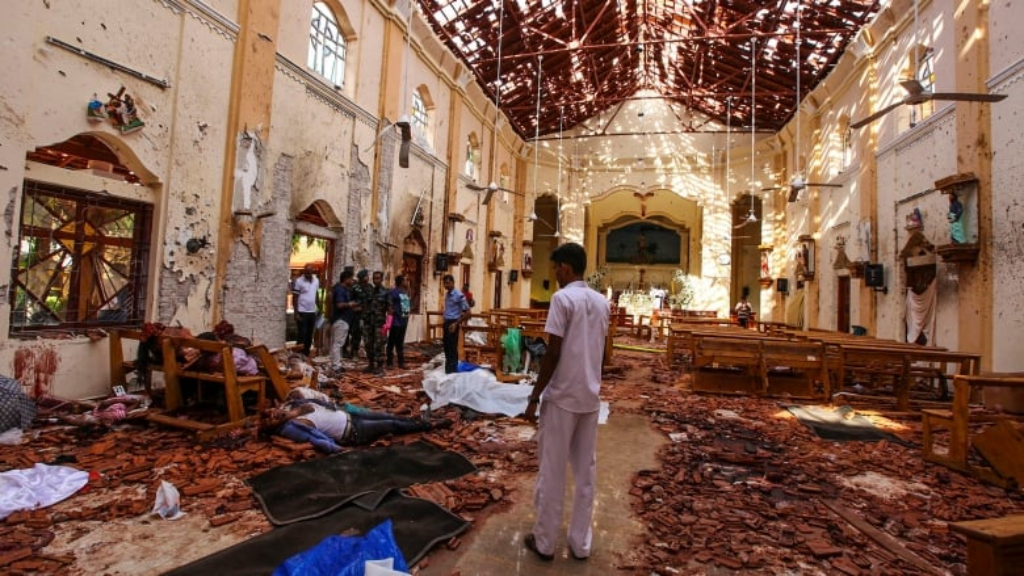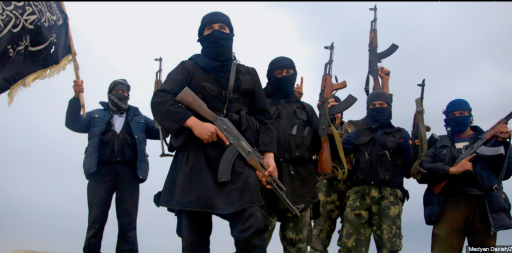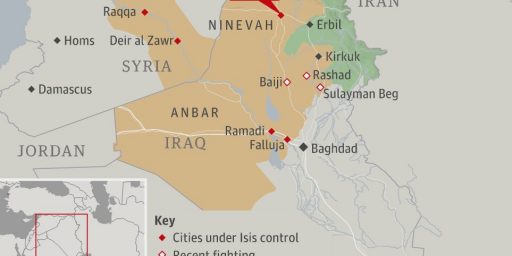Sri Lanka Attacks Prove That ISIS Has Not Been Defeated
Sunday's attacks in Sri Lanka make it clear that the claim that ISIS has been defeated are nowhere close to being true.

The New York Times notes that Sunday’s attacks on churches and hotels in Sri Lanka appear to be a signal of a change in strategy and targets by ISIS and jihadist terrorists in general, a development that poses significant problems for the future:
A bearded man wearing a heavy backpack and sandals walks deliberately across the courtyard of St. Sebastian’s Church in Sri Lanka on Easter Sunday. Moments later, he slips past the pews where women are sitting with their hair covered in veils of white lace, then detonates a bomb.
The explosion that followed — one of numerous blasts unleashed by eight suicide bombers at six sites in three cities — was strong enough to blow the tiles off the church roof.
At least 250 people died in the coordinated attacks, which were believed to have been carried out by a local cell that had pledged allegiance to the Islamic State. That would make it one of the deadliest attacks carried out by the group, nearly twice as lethal as the 2015 Paris attacks.
Just four weeks after the ISIS caliphate was erased in Iraq and Syria — and four months after President Trump first claimed the group was defeated — the terrorist group has reminded the world in dramatic fashion that it does not need to control territory to be a major threat.
“ISIS is not in disarray; it’s not ‘defeated,'” Laith Alkhouri, a senior director at Flashpoint, which assesses the global terrorist threat, said in a Twitter post on Wednesday. “It’s not a membership-based organization. It’s skilled at reorganizing and modifying its strategy to fit the evolving security landscape around the world.”
Experts say the group has simply pivoted to exploit the resources at hand and the notoriety it has banked as a global brand. With its command-and-control hierarchy in Syria and Iraq seriously degraded, it has become more decentralized, turning to its affiliates further afield to spread its message and mayhem.
“As its core weakens, its peripheries will become more dangerous,” Charlie Winter, a senior research fellow at the International Center for the Study of Radicalization at King’s College London, tweeted on Thursday.
The Islamic State has always seen the caliphate as a global project, and despite the loss of territory in Iraq and Syria has continued to expand abroad.
When the remnants of Al Qaeda were driven from Afghanistan in 2002, the group was also forced to become more decentralized, turning to foreign franchises in places like Yemen, Iraq and northern Africa to regenerate. But unlike Al Qaeda then, the Islamic State already has numerous affiliates around the globe, an influential media ministry and thousands of fighters still underground in the group’s home base in Iraq and Syria.
As early as 2015, ISIS began instructing recruits to migrate to territory held by its overseas affiliates. And in a development sometimes missed by local officials abroad, it began signing up kindred local groups in distant outposts.
“Rather than building up membership from scratch, the group poaches members from existing hard-liner groups, or oftentimes the entire groups themselves,” wrote Rita Katz, a co-founder of SITE Intelligence Group, which monitors extremist propaganda.
In the Philippines, ISIS recruited insurgents from Abu Sayyaf to create what it considers its East Asia Province, which carried out an attack on a cathedral in January, killing 23 people. The ISIS affiliate in Afghanistan has swallowed whole units of Taliban fighters.
More recently, it cobbled together a new “province” in the Democratic Republic of Congo by recruiting members of the Allied Democratic Forces rebel group, which received cash transfers from an ISIS financier.
These groups have felt little impact from the loss of territory in Iraq and Syria, and need no direct communication from the Islamic State to understand its objectives, which the terrorist group broadcasts in regular audio messages.“They understand that the mission within their geographies is to amplify operations against law enforcement, military and, yes, non-Muslim and Shia groups,” Mr. Alkhouri said.
They also have local knowledge that can help identify seams in a country’s defenses — like the fact that after a 26-year military campaign against ethnic Tamil insurgents, most of whom are Hindu, Sri Lankan security officials were more focused on them than on Islamist extremists.
That blind spot may have contributed to Sri Lankan officials’ failure to act on warnings by Indian intelligence of a plot to bomb churches.
“When combined with ISIS’ technical know-how and expertise, the combination with the local knowledge of more parochial groups can have devastating effects,” said Colin P. Clarke, a senior fellow at the Soufan Center, a research organization for global security issues.
This new decentralized ISIS has also changed its media and communications strategy:
As it has decentralized, ISIS has increasingly depended on its mass-media operation, which continues to spread its message around the world.
Every day since officials of the American-led military coalition touted the end of the caliphate, the group’s media operatives have issued claims of responsibility for attacks around the world.
On the same day as the Sri Lanka attack, for instance, ISIS issued a video showing Saudi jihadists pledging allegiance to Mr. al-Baghdadi before carrying out an assault near Riyadh and it published details of an attack by its Afghan affiliate on the country’s Ministry of Communications.
“Because ISIS’s media machine capitalizes on every single sphere of operation, it looks to many of its followers as still a strong, global group,” Mr. Alkhouri said. “Followers wholeheartedly believe that the breakdown of their caliphate in Iraq and Syria is nothing but a temporary tribulation.”
While the group’s production of high-end videos has declined, the constant stream of propaganda published around the clock in multiple time zones and languages suggests that ISIS’ media unit has a global network of editors and writers.
As I noted earlier this week when ISIS claimed responsibility for the Sunday attacks, it has been apparent for some time that ISIS was in the process of attempting to become a worldwide operation such that the destruction of its purported caliphate would not mean the end of the organization, its message, or its influence. Well before the military setbacks it suffered in Syria, the group was moving to expand its influence in other parts of the world such as North Africa, where Libya has become something of a breeding ground for all kinds of terrorist groups, and in places like Afghanistan. There have also been reports of ISIS agents making contact with Jihadist groups in parts of Central Africa with large Muslim populations and in nations such as Indonesia and The Philippines which, until now, have managed to avoid being sucked into the fray of jihadist violence that has swept through the Middle East, including apparently gaining a foothold in Sri Lanka by allying itself with a local jihadist group just as it has done in other parts of the world.
All of this makes the claims of the Trump Administration that ISIS has been defeated ring quite hollow. If anything, it seems clear that the group remains as influential as it ever has been and that it retains the ability to both influence domestic actors inclined toward terrorism and to infiltrate nations to commit acts of terror against seemingly at whim. This decentralized version of ISIS, which isn’t all that different from it’s rival al Qaeda, poses a larger threat to the west and other parts of the world largely because it makes it harder to target the organization and nearly impossible to defeat it. The only effective strategy at this point would seem to be trying to track down where its financing is coming from and cutting off its ability to communicate its message across the world via the Internet. Neither one of these are things that the American military is particularly well-trained to do and it’s unclear if American intelligence forces are any better equipped to handle the task at the moment.
All of this establishes that ISIS has not been defeated, that it remains capable of pulling off horrific terrorist attacks against seemingly random targets, and that defeating ISIS isn’t going to be any easier than “defeating” al Qaeda, which still exists some eighteen years after the September 11th attacks, has been.





Dude, ISIS didn’t carry out the attack, it was a home-grown Sri-Lankan Islamist militant group (based on what we know to this point). This group MAY have some ties to ISIS (The extent of which are still not known), but it is not ISIS.
But #DerangedDonnie told me that ISIS has been defeated.
He even had a neat graphic so I could understand.
https://www.nytimes.com/2019/03/20/us/politics/trump-isis.html
One of you is a liar.
Just sayin’
@Andy:
Another terrorism expert heard from. Where’s Cheney, and the PNAC?
@Daryl and his brother Darryl: probably at a bar with John Bolton trying to figure out how to turn this into invading Iran.
@Daryl and his brother Darryl:
You don’t need to be a terrorism expert, you just need to read a bit more widely. There are currently only two ties between the bombers and ISIS:
– A public claim of responsibility from ISIS (doesn’t mean much, they claim credit for a lot of things they had nothing to do with).
– A video from the bombers pledging allegiance to Baghdadi (doesn’t mean much by itself as pledging allegiance is also common in martyr videos).
That is not enough evidence to determine that ISIS was responsible for this attack. Therefore, using this attack as proof that ISIS is or isn’t defeated is meaningless. Simple, right?
But full disclosure, I was in the intelligence community for 23 years, so I have some first-hand experience on this topic.
@Andy:
There are proven links between ISIS and that group and proof that several of the attackers killed in the attacks had been to Syria in recent years in areas controlled by ISIS
@Doug Mataconis:
Do you have a reference for that?
Tiny on ISIS, all that is missing is the aircraft carrier and mission accomplished banner.